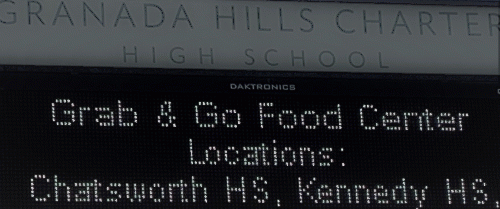"We're in uncharted waters"
-LAUSD Superintendent Austin Beutner
In March, as administrators at the Los Angeles Unified School District (LAUSD) prepared to close schools in response to the COVID-19 crisis, they made sure that students were sent home with two weeks of lesson plans. However, they knew that they had much more to worry about, especially if the shutdown was extended indefinitely. Most importantly, arrangements had to be made for the 405,000 students who qualify for free and reduced-price lunch and depend on the district to alleviate food insecurity.
The initial solution to this problem involved opening 40 family resource centers on school sites throughout the district. These would have provided a supervised place for children "to have a warm meal, engage with their peers, and pursue their different studies." These plans fell apart quickly as conditions surrounding the pandemic rapidly deteriorated. Instead, the LAUSD opened Grab and Go Food Centers. These allowed the district to distribute meals to those in need while maintaining social distancing.
The Northridge East Neighborhood Council's Education Committee discusses the LAUSD Grab and Go Meals program
(Image by YouTube, Channel: Carl Petersen) Details DMCA
An important component of these centers is the fact that IDs are not required to receive the food. This means that the LAUSD is serving not only public school students and their families but all families who are in need. This would include those whose children attend charter schools.
According to their own SARC report, 52.7% of the students at Granada Hills Charter High School are "socioeconomically disadvantaged." This privately-run school is the self-proclaimed "largest charter school in the nation," and has more students enrolled than 86% of all school districts in the entire country. The school receives the same funding for each student as the LAUSD along with funds for providing free and reduced-price lunches to low-income students. Granada also has a fundraising foundation whose board members have included Austin Beutner and Mitch Englander. Yet, with all of these resources, the Granada High School campus does not have a Grab and Go type program similar to the LAUSD. Instead, their electronic message board outside the school directs those in need to visit LAUSD schools.
This lack of support for the needs of its surrounding community is not new for Granada. While sending people to Chatsworth and Kennedy High Schools for needed meals is new, these district schools have long picked up the slack as Granada cherry-picks students who are cheaper to educate and allows Granada to report higher test scores. In one year, Kennedy enrolled a greater number of students with disabilities despite its student body being less than half the size of its charter school counterpart. In fact, the nearest four LAUSD high schools each had at least double the percentage of students with disabilities as Granada has.
Granada is not the only charter that avoids the responsibility of educating those with special needs. The State of Denial report by UTLA and the California Teachers Association found that 11.01% of students in charters have disabilities while 14.27% of the student bodies of public schools have disabilities. The disabilities encountered in public school classrooms are also more likely to be severe.
Avoiding the enrollment of children with special education needs is not the only way charter schools save money. Ever since the cost-cutting of the last Great Recession, summer school programs have been severely limited, leaving most failing students without the help they need to meet their full potential. The district's summer school programs are also open to students enrolled in charter schools. As an example, when the North Valley Military Institute (NVMI) was caught illegally charging their students to attend their summer school program, the school threatened to shut it down and instead direct their students to enroll in LAUSD programs. For an entire school year, NVMI collected education funds for these students but did not seem to see the moral dilemma in forcing the LAUSD to absorb the cost of ensuring that they did the work needed to pass.
While the Republican-held Senate holds up a bill that would provide $58 billion to local school districts to help them offset the costs of the COVID-19 crisis, charter schools have been given special access to the government funds. As students suffer through the consequences of the crisis, Education Secretary Betsy DeVos said that "this is an opportunity" to promote the privatization of public education and handed over $440 million to corporate charter school chains. At its April 27, 2020, meeting, Granada's governing board voted on authorizing a "loan application for the Small Business Administration Paycheck Protection Program through [the] East West Bank." This federal program was meant to help small businesses, not publicly funded organizations. Many small businessmen will not receive the help that they need as the program has already run out of funds.
The distinct difference between the approaches of the LAUSD and Granada will play out before the voters as we approach the November election. The incumbent school board member, Scott Schmerelson, has been on the front line during this pandemic handing out food, holding virtual information meetings during this crisis on important subjects like mental health, and personally assisting parents navigating the unique needs of integrating distance learning for children with disabilities. Granada created a position so that Marilyn Koziatek could continue to collect a paycheck while running against Schmerelson. Koziatek says that her experience as a Granada employee will help her bring Granada's methods of operation to the LAUSD. The COVID-19 crisis has exposed how much that would hurt the more vulnerable members of society.

LAUSD Board Member Scott Schmerelson helping out at a Grab and Go Meals site.
(Image by Scott Mark Schmerelson) Details DMCA
________________________________
Carl Petersen is a parent, an advocate for students with special education needs, an elected member of the Northridge East Neighborhood Council, an appointed alternate to theLAUSD's CAC, and was a Green Party candidate in LAUSD's District 2 School Board race. During the campaign, he was endorsed by the Network for Public Education (NPE) Action and Dr. Diane Ravitch called him a "strong supporter of public schools." His past blogs can be found at www.ChangeTheLAUSD.com. Opinions are his own.






